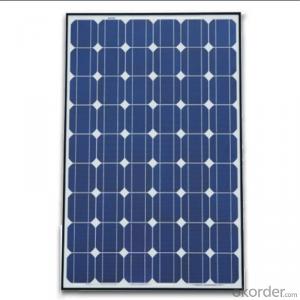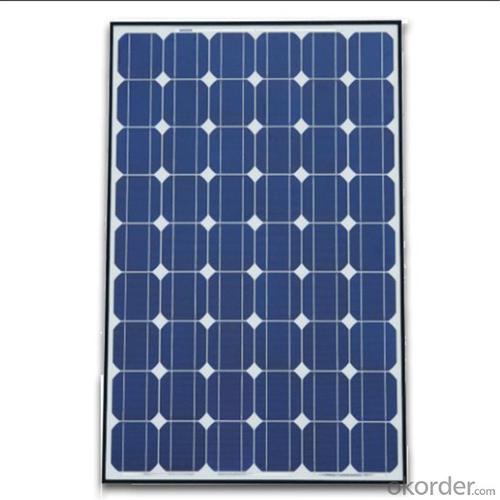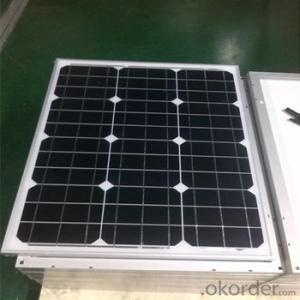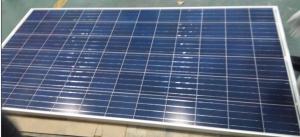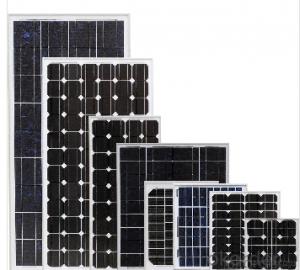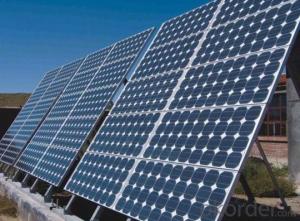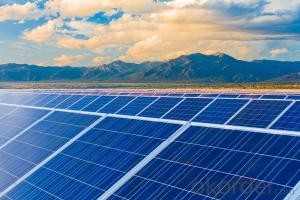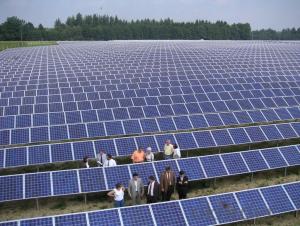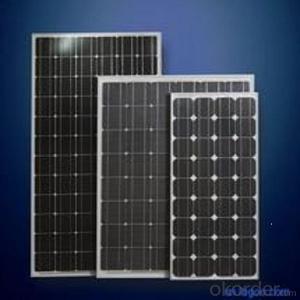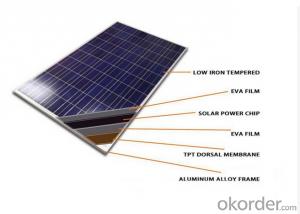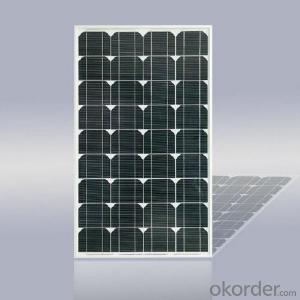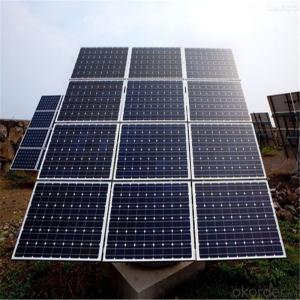260 Watt Algae Solar Panels
- Loading Port:
- China main port
- Payment Terms:
- TT OR LC
- Min Order Qty:
- 1000 watt
- Supply Capability:
- 500000 watt/month
OKorder Service Pledge
OKorder Financial Service
You Might Also Like
Specification
Instruction
1) Product name: solar panel / module
2) Solar cell: Mono-crystalline / Poly-crystalline / Amorphous
3) Tempered glass laminated with aluminum frame
4) Life time: 20 - 25 years
5) Temperature co-efficiency: A=+1,46mA B=-79mV, Rp/p=-0.43
6) Power specification at 1kW/m 2, AM 1, 5
7) Output cable: multi contact connectors
8) Construction:
a) Front: High-transmission 32mm tempered glass
b) Back: TPT
c) Encapsulant: EVA
9) Frame: aluminum
10) Certification: CE, TUV
Feature
1. Nominal 18V DC for standard output.
2. Cable connectors for easy installation.
3. Outstanding low-light performance.
4. Splendid aesthetic appearance and easy installation.
5. High efficiency & high stability.
6.Advanced EVA encapsulation system with TPT back sheet to improve product modules
7. Design to meet unique demand of customer.
8.25 year module output warranty.
9. Rugged design to withstands high wind pressure and snow load, easy installation.
10. Designed to comply with rigorous operating conditions, including test.
Images
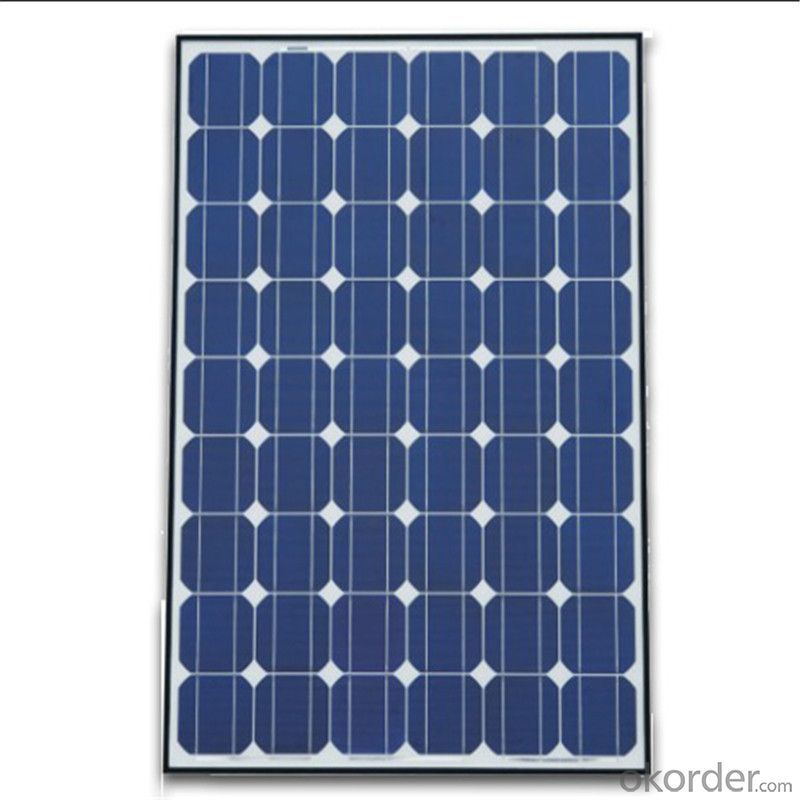
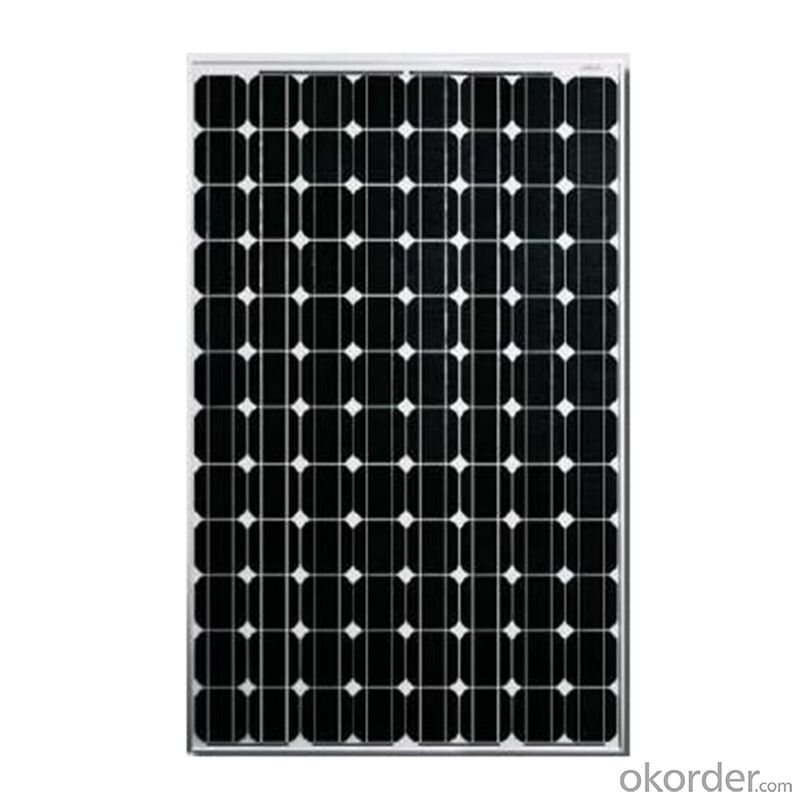
Specification
Electrical Characteristic of Mono Solar Cells
Type | CNBM Solar Polycrystalline Series II (235W—245W) | ||
Materials | Silicon | ||
Size | Length | Width | Height |
1640 | 992 | 40 | |
Guarantee | 12 yrs free from defects in materials and workmanship No less than 90% within 10yrs and no less than 80% within 25yrs TUV(IEC61215&IEC61730), CE, UL | ||
Application | Photovoltaic/solar/ green energy/energy saving | ||
Descriptions | 1.High efficiency crystalline silicon solar cell. Even if under the weak light, the solar module can produce maximum power output. 2.Tempered glass (toughened glass): Anti-reflecting coating and high transmission rate glass increase the power output and mechanical strength of solar module. 3. EVA and TPT: Using high quality EVA and TPT to prevent destroying and water. 4. AI frame: Without screw, rner connection. 6 holes on the frame can be installed easily. 5. Junction box: Multi function junction box with water proof. 6. Long lifetime: ≥25 years; Less power decrease. 7. Good performance of preventing from atrocious weather such as wind and hails. 8. Resisting moisture and etching effectively, not effected by geology. 9. The certificate issued by international authority: UL, TUV, IEC, CE.
| ||
Packaging Details: | 26pcs/pallet, 28pallets/ 40HQ Our solar panels are packed in cartons, and then pallet. Shipping by sea or by air are both ok, it up to customer’s chose. We’d like to inquiry the freight cost for customer after be informed exact quantity and destination address. | ||
FAQ
We have organized several common questions for our clients,may help you sincerely:
1). What’s price per watt?
A: It’s depends on the quantity, delivery date and payment terms of the order. We can talk further about the detail price issue. Our products is high quality with lower price level.
2). Can you tell me the parameter of your solar panels?
We have different series of cells with different power output, both from c-si to a-si. Please take our specification sheet for your reference.
3). How do you pack your products?
We have rich experience on how to pack the panels to make sure the safety on shipment when it arrives at the destination.
4).Can you do OEM for us?
Yes, we can.
5). How long can we receive the product after purchase?
In the purchase of product within three working days, We will arrange the factory delivery as soon as possible. The perfect time of receiving is related to the state and position of customers. Commonly 7 to 10 working days can be served.
- Q: What is the impact of roof color on solar panels' performance?
- The impact of roof color on solar panels' performance is minimal. While a darker roof color may slightly increase the temperature of the panels, leading to a slight decrease in efficiency, the difference is typically not significant enough to significantly impact their overall performance. Other factors such as panel tilt, orientation, shading, and maintenance have a much larger influence on solar panels' performance.
- Q: Can solar panels be used to power a data center?
- Yes, solar panels can be used to power a data center. By installing a sufficient number of solar panels, the energy generated from sunlight can be harnessed and converted into electricity to power the data center's operations. However, the feasibility of solely relying on solar power depends on factors such as the size of the data center, energy requirements, geographical location, and sunlight availability. To ensure a consistent power supply, additional energy storage systems or backup sources may be needed.
- Q: How much space is required for solar panel installation?
- The amount of space required for solar panel installation depends on various factors, including the size and number of panels, their efficiency, and the energy needs of the property. On average, a residential solar system typically requires around 100-400 square feet of roof space per kilowatt of installed capacity. However, ground-mounted systems can require larger areas, while more efficient panels may require less space. It is recommended to consult with a solar installer to assess the specific space requirements for your installation.
- Q: we are doing a fundraiser to have students pledge to make donations for a solar panel instalation on one of the school buildings. I am looking for a slogan for the campain.
- nasa solar panels seem to be better than silica / silicone (i forgot the exact chemical) they make them with ink and aluminum then case them in glass, they are supposed to last like 30 years or something. good stuff. anyway a SLOGAN: solar pannels save money, and over the long run allow the school to save tht momney or use it somewhere else in the school, ie better food, better seats, better computers, whtever. maybe you can relate the campain slogan to what the savings will be used for. maybe a new scince program thats funded solely on the savings of the panels. but ok a slogan: IT'S OBSCEEEENCE, ROTFL... GIVE SOME DOLLAR$$ AND GO GREEEEEN!!!!!! eh, i know not so hot, gimme a minuet. lol LET'S MAKE THIS PANEL HAP'N CAP'N... MIB! LMAO THE SUN, FREE FUN, COME ON AT LEAST GIVE ONE (place pic of dollar bill below the ONE) good luck.
- Q: Can solar panels be installed on factories or manufacturing facilities?
- Yes, solar panels can be installed on factories or manufacturing facilities. In fact, many industrial buildings are ideal for solar panel installations due to their large roof space and high energy consumption. Installing solar panels on such facilities can help reduce electricity costs, decrease reliance on traditional energy sources, and contribute to a more sustainable and environmentally friendly operation.
- Q: How about using Solar Panals to provide the electrical power to separate the H2 from the O? H2 would be fed into the engines carburator like a gas/air mixture ratio, but H2/air mixture ratio instead. How would you control the exact measurements?
- H2 has more energy per weight – but requires twice the volume of fuel. It is unsafe to transport as a liquid or gas (usually in a carrier medium of some sort) Solar panels are expensive (low output per $) and expire after some use. They are dirty and energy inefficient to make too. However: hydroelectric, wind, and sea technologies may offer some improvements in costs with oil prices as high as they are.
- Q: Can solar panels be used in areas with high levels of vandalism?
- Yes, solar panels can be used in areas with high levels of vandalism. However, it is important to implement additional security measures, such as installing anti-vandalism devices, using tamper-proof mounting systems, and employing surveillance systems to deter potential vandals. Regular maintenance and quick repairs are also crucial to ensure the optimal functioning of solar panels in such areas.
- Q: What is the cost of installing solar panels?
- The cost of installing solar panels can vary depending on various factors such as the size of the system, the location, and any additional equipment or services needed. However, on average, the cost can range from $10,000 to $30,000 for a residential installation. It is important to get a personalized quote from a solar installation company to determine the exact cost for your specific needs.
- Q: Can solar panels be used in areas with frequent lightning storms?
- Yes, solar panels can be used in areas with frequent lightning storms. While lightning poses a potential risk, modern solar panels are designed with safety features to mitigate the impact of lightning strikes. These features include grounding systems, surge protectors, and lightning arrestors. Additionally, solar panels are built to withstand extreme weather conditions, including lightning storms, ensuring their durability and functionality in such areas.
- Q: . Do they scratch easily? How do I remove snow from them without scratching them?2. What does the upkeep of many solar panels consist of? I want to have my electricity completely off of the grid.3. Are all solar panels made from the same material, regardless of size?
- . Do they scratch easily? No How do I remove snow from them without scratching them? Just wipe the snow off 2. What does the upkeep of many solar panels consist of? Clean them with tap water and paper towels once a month. 3. Are all solar panels made from the same material, regardless of size? Basically the same.
Send your message to us
260 Watt Algae Solar Panels
- Loading Port:
- China main port
- Payment Terms:
- TT OR LC
- Min Order Qty:
- 1000 watt
- Supply Capability:
- 500000 watt/month
OKorder Service Pledge
OKorder Financial Service
Similar products
Hot products
Hot Searches
Related keywords
